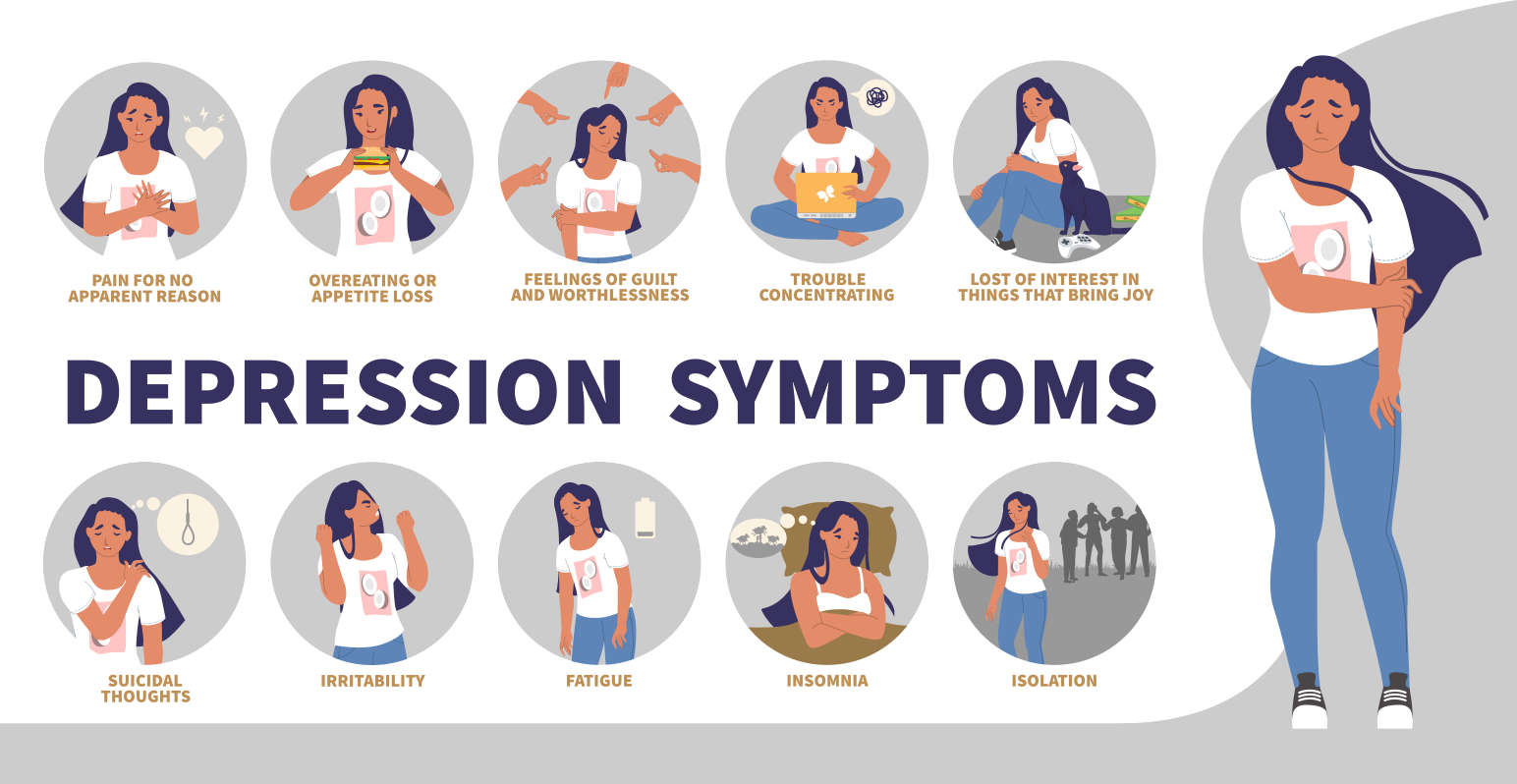Midlife Depression in Men and Women
Understanding Midlife Depression
Middle age is a time of significant transition, often marked by a period of reflection and reassessment. This stage of life can bring about various challenges that have the potential to trigger or exacerbate depression in both men and women.
Career Pressures
One of the primary concerns is career-related stress. The pressure to maintain a stable career, coupled with fears of job loss or the uncertainties surrounding retirement, can lead to feelings of inadequacy and anxiety about the future. The fear of not having achieved enough or the stress of meeting ongoing professional demands can weigh heavily on individuals, contributing to a sense of hopelessness and depression.
Health Worries
Health concerns also become more prominent in middle age, as the onset of age-related health issues or chronic illnesses can lead to a heightened sense of vulnerability. As physical abilities begin to decline, individuals may experience a loss of independence and a fear of becoming a burden to others. These feelings can contribute to a pervasive sense of decline, which can be deeply distressing and lead to depressive symptoms.
Family Concerns
Family dynamics often shift during middle age, adding another layer of emotional complexity. Many individuals face the challenge of adjusting to an “empty nest” as children leave home, which can result in feelings of loneliness and a loss of purpose. Conversely, some may find themselves in the role of caregiver for aging parents, which can create significant emotional and physical stress. Balancing these changing family roles can be overwhelming, leading to increased feelings of sadness and isolation.
Relationships
Relationship struggles are another common source of depression during middle age. Marital dissatisfaction, the possibility of divorce, or the loss of a partner can have a profound impact on mental health. The strain of unresolved conflicts, the stress of separation, or the grief of losing a loved one can lead to deep emotional pain and a sense of despair. These relationship challenges can make middle age a particularly vulnerable time for experiencing depression.
Make a Booking With Gold Coast Counselling For Depression
7 Symptoms of Depression in Middle-Aged Adults

Depression during middle age can manifest in a variety of ways, often presenting differently in men and women.
1) Sadness
One of the most common symptoms is persistent sadness—a pervasive feeling of emptiness that lingers and seems impossible to shake. This emotional heaviness can cast a shadow over daily life, making it difficult to find joy in once-pleasurable activities.
2) Fatigue
Fatigue is another frequent symptom, characterized by a lack of energy that hinders the ability to carry out even routine tasks. This persistent tiredness can be both physically and mentally draining, further diminishing one’s quality of life.
3) Problems with Sleep
Sleep disturbances, whether in the form of insomnia or excessive sleeping, are also common among those experiencing depression in middle age. These sleep disruptions can exacerbate other symptoms, creating a vicious cycle that deepens the depressive state.
4) Appetite Changes
Changes in appetite are also frequently observed, with some individuals experiencing significant weight loss or gain due to altered eating habits. This can be tied to a loss of interest in food or, conversely, emotional eating as a way to cope with stress and sadness.
5) Lack of Interest
Alongside these physical symptoms, diminished interest in activities that were once enjoyed—such as hobbies, social gatherings, or even work—can indicate the presence of depression. This withdrawal from previously enjoyed activities further isolates individuals and reinforces feelings of sadness.
6) Cognitive Impairments
Cognitive impairments are another hallmark of depression in middle-aged adults. Individuals may find it increasingly difficult to concentrate, make decisions, or remember important details. These cognitive challenges can lead to frustration and a sense of being overwhelmed, particularly in professional or personal settings.
7) Feeling of Worthlessness
Finally, feelings of guilt or worthlessness often accompany depression during this life stage. Individuals may struggle with a negative self-perception, feeling like they have failed in their life achievements or personal relationships. This deep-seated sense of inadequacy can be particularly crippling, reinforcing the cycle of depression.
Gender Differences in Depression During Middle Age

Midlife Crises In Men
While both men and women are susceptible to depression during middle age, they often experience and express it in different ways. Men, for instance, may be more likely to suppress their emotions due to societal expectations of masculinity. This emotional suppression can lead to increased stress and a greater likelihood of depressive symptoms. Rather than expressing sadness, men may exhibit irritability and anger, which can sometimes be mistaken for other issues rather than recognized as signs of depression.
In addition to emotional suppression, men may engage in risky behaviours as a way to cope with their depression. This can include substance abuse, reckless driving, or other forms of self-destructive behaviour. These actions are often a misguided attempt to escape the emotional pain they are experiencing. Furthermore, men are generally more reluctant to seek help due to the stigma associated with mental health issues and the societal pressure to maintain a strong, stoic exterior. This reluctance can prevent them from accessing the support and treatment they need, allowing the depression to worsen over time.
Midlife Crises In Women
In contrast, women are generally more open about their emotions and are more likely to seek social support when experiencing depression. This openness can be a protective factor, as it allows women to share their feelings and receive comfort from others. However, women may also experience anxiety and excessive worry as prominent features of their depression. This constant state of anxiety can make it difficult to find peace or relaxation, contributing to the overall burden of depression.
Somatic symptoms—physical manifestations of emotional distress—are also more commonly reported by women. These can include chronic pain, headaches, or digestive issues, which are often linked to their depression. These physical symptoms can be particularly challenging, as they add another layer of discomfort and can be difficult to treat if the underlying emotional causes are not addressed. Despite these challenges, women are more likely to seek professional help, recognizing the importance of addressing their mental health needs. This proactive approach can lead to earlier intervention and more effective treatment outcomes.
Make An Enquiry With a Gold Coast Counsellor Near Me
How Counselling Can Help for Midlife Depression

Counselling is a powerful tool for managing and overcoming depression, particularly during the complex middle years of life. Here’s how it can help:
Emotional Support and Validation
Counselling provides a safe space where individuals can express their feelings without fear of judgment. The validation of their emotions by a professional can be incredibly healing and can help reduce the stigma associated with depression.
Identifying and Addressing Root Causes
Through counselling, individuals can explore the underlying causes of their depression, whether they are related to past trauma, unresolved conflicts, or current life stressors. Understanding these root causes is the first step toward healing.
Developing Coping Strategies
Counsellors work with individuals to develop effective coping strategies tailored to their unique situations. This may include techniques for managing stress, improving communication skills, and setting realistic goals for personal growth and well-being.
Cognitive Behavioral Therapy (CBT)
CBT is a common therapeutic approach used in counselling to help individuals identify and challenge negative thought patterns that contribute to their depression. By reframing these thoughts, individuals can develop a more positive and balanced perspective.
Improving Relationships
For those struggling with relationship issues during middle age, counselling can also focus on improving communication and resolving conflicts with partners, family members, or colleagues. Strengthening these relationships can significantly enhance one’s emotional well-being.
Providing a Path to Personal Growth
Counselling during middle age is not just about addressing depression but also about fostering personal growth. It’s an opportunity to reassess life goals, build resilience, and create a more fulfilling life path.

Seeking Help For Midlife Depression
Depression in middle-aged men and women is a complex issue that requires understanding, compassion, and professional support. If you or someone you know is experiencing symptoms of depression, seeking help is a crucial step toward recovery.
Southport Counsellor Lee Calleja at Chirn Park Health Group offers both online consultations in private and in-chair sessions at our Southport Clinic, providing flexible and personalised care to meet your needs.
Don’t hesitate to reach out and take the first step toward healing and a brighter future.









